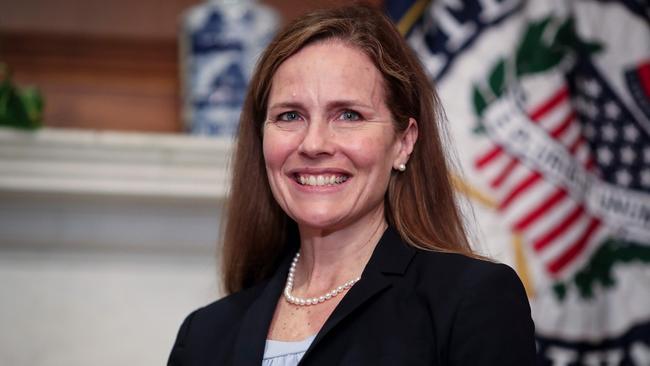Amy Coney Barrett the right choice to replace Ginsburg as justice
Donald Trump’s nomination for the US Supreme Court is ideally qualified.

The first two descriptors may be true of the US President’s temperament and character, but the last is definitely not. His choice to fill the vacancy left by Ruth Bader Ginsburg’s death is inspired. Amy Coney Barrett is not only eminently well qualified by her legal credentials but even the things that raise the ire of her so-called progressive opponents are also in her favour: her much discussed Catholicism and her large family.
By choosing Barrett, who has fulfilled both the feminist and conservative tick sheet, Trump has left the so-called progressives without any argument against the appointment.
When her nomination was announced, older feminists carrying the Ginsburg hagiographical torch were grinding their teeth over a Catholic mother of seven on the court. For them she is an ideological symbol. Her life, her personality, her academic and judicial record, even her amazing achievements as a woman and mother are not of any value to ideologues because she is a threat, not to justice, not to the constitution, but to Roe v Wade.
Inquisitor-in-chief Dianne Feinstein has tried the “dogma speaks loudly in you” line, code for religious extremist, which she tried before with Brett Kavanaugh. It didn’t work then and it won’t work now.
In a country where freedom of religion is taken seriously, Barrett’s membership of a charismatic Catholic parish group is hardly controversial, especially when it is the largest growing form of worship across the world.
Barrett is an orthodox believing Catholic. The People of Praise is a covenant group, a feature that is common in the US. It is part of the charismatic renewal that began in the Catholic tradition in the late 1970s after Vatican II. It favours a demonstrative form of liturgy and a loosely communal lifestyle based on the ideals of the early Christians.
As a person whose liturgical tastes are more pre-Council of Trent than post-Vatican II, and whose local parish is too communal for me, I am not a fan of the charismatics. It has been criticised as a sect, but even Pope Francis has praised their enthusiasm and members are free to leave without leaving the church. Importantly, they live good lives, as Barrett’s commitment to her family indicates. Naturally her religion guides her conscience. That is what it is supposed to do, but her views as stated on the US constitution are clear. She is an originalist and will read it as written.
The politicisation of the Supreme Court is one of the most regrettable features of US democracy because it has become a sort of oligarchy, and there is no doubt that Barrett’s appointment will be political. Many moderates on the right and the left quite reasonably did not think a new appointment before the presidential election was justified, a fair criticism.
However, realists can see the court is so politicised that even someone who has a fairly objective view and has stated that she is willing to put her own views to one side cannot be free of criticism.
It seems impossible to depoliticise the court. Even now some Democrats, among them Kamala Harris, have started to mumble hypocritically about “packing” the court in the event of a Biden win.
Trump taunted Biden with that prospect in this week’s shambolic debate. However, that didn’t work for Franklin Roosevelt in 1937 and it won’t work now. It would look a lot worse than appointing a conservative to the court before the election; it would look desperately undemocratic, almost a case of ideological dictatorship.
However, it is not just as an originalist conservative that Barrett is feared by the left. It is because she does not carry the same ideological baggage they carry. Her view of human rights is broader than Ginsburg’s and she will not pursue the same narrow ideological agenda. So, while hacking into Barrett for her religion, which the left sees as mere ideology, they will not admit that Ginsburg brought her own ideology in some of her judgments.
In Box v Planned Parenthood (May 28, 2019), Ginsburg criticised justice Clarence Thomas for using the term mother in regard to a pregnancy. She wrote that a woman who exercised her constitutionally protected right to terminate a pregnancy was not a mother. The consequence to that line of thinking is that the contents of a pregnant woman’s womb are depersonalised as the woman’s property. So it is easy to argue that her ownership and disposal rights over her property are constitutionally protected.
Barrett, a constitutional law authority who clerked for justice Antonin Scalia, is ideally placed and superbly qualified to correct Ginsberg’s monumental mistake because she is also the mother of seven children and has carried five of them. So here we come to the nub of why so many permanently outraged feminists are afraid of her. As a mother she instinctively knows that you simply cannot reduce an unborn human being to the status of property.
The world will be watching Barrett’s confirmation hearings. The most interesting thing about her possible appointment is that Barrett has cut the ground from under the ideological feminists. They will try to attack her beliefs but they are unassailable because she is a devout Christian in a Christian country and hers is a life that can be examined as minutely as they please but it will bring her only kudos. What annoys her opponents even more is that, as a consummate professional and mother, she is almost an ideal for the feminist cause. So where are the opponents of this woman to go? Answer: nowhere — although doubtless the acolytes are ordering their Handmaid costumes from theatrical outfitters.




Anyone who thinks Donald Trump is a ham-fisted, bellicose nincompoop may think again.